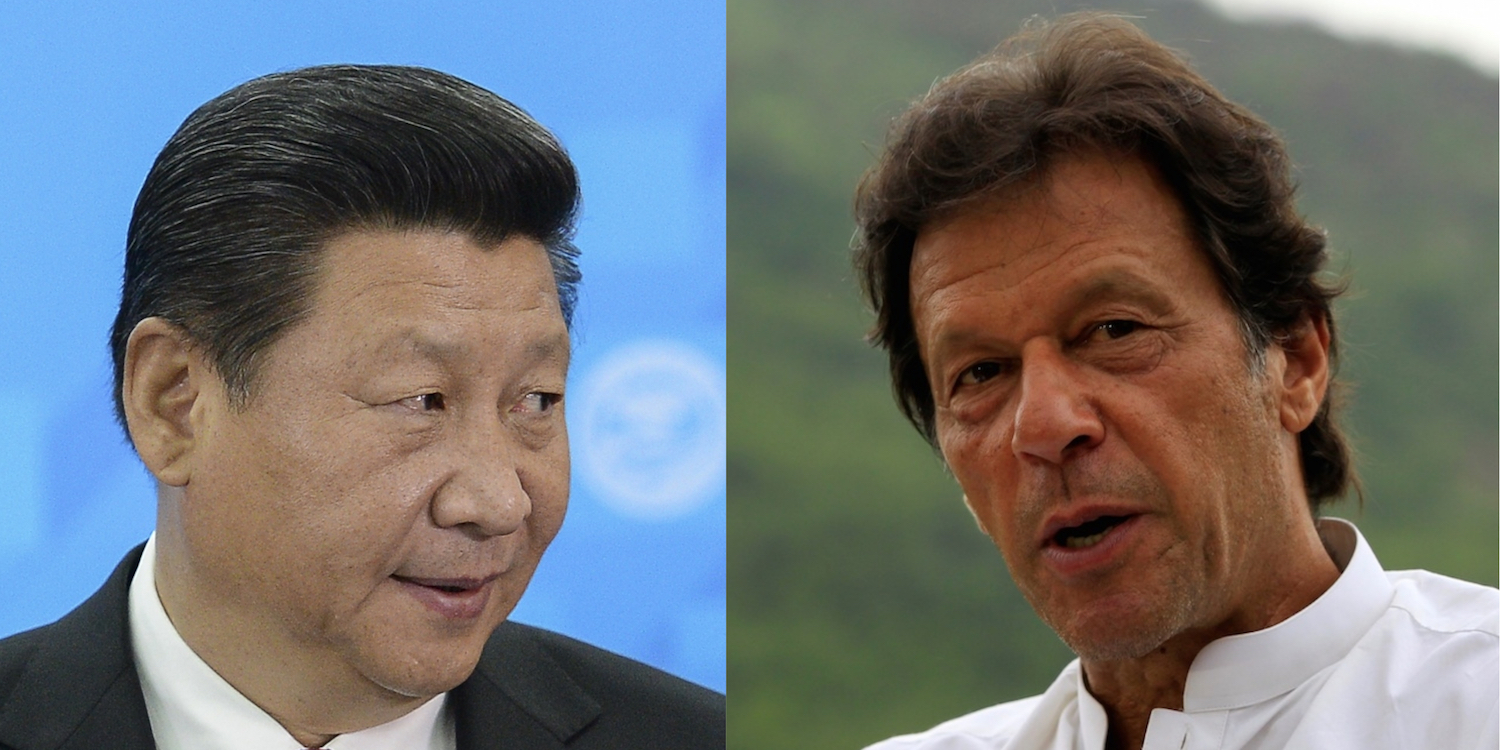- China is facing international pressure over its crackdown on its Muslim ethnic minority, the Uighurs.
- Chinese authorities are accused of arbitrarily imprisoning Uighurs in prison-like camps and making them renounce their religion.
- More and more activists and countries, including those with Muslim majorities, are condemning Beijing over these actions.
- Pakistan, a major economic ally of China, was first to censure Beijing. But over the past few months, it started toeing the Chinese line.
- Experts say it illustrates the power of Chinese money.
Pakistan, China’s largest economic ally in the Muslim world, abruptly stopped censuring Beijing over its unprecedented crackdown on Muslims.
The shift clearly illustrates the power of Chinese money, activists and critics say.
China is facing international pressure over its treatment of the Uighurs, a majority-Muslim ethnic minority who live mainly in the northwestern region of Xinjiang.
Activists accuse Chinese authorities of imprisoning up to 1 million Uighurs in prison-like camps, where detainees are reportedly forced to sing hymns to President Xi Jinping and renounce their religion.

Beijing justifies these measures as counterterrorism, and routinely calls the camps "free vocational training," meant to turn Uighurs into "normal persons."
After an initial period of silence, Muslim nations have started to speak out about the treatment, which has been condemned by the UN and the US, as well as by dozens of human rights groups.
Read more: A wall of silence around China's oppression of its Muslim minority is starting to crumble
But Pakistan - where Islam is the state religion and where Muslims make up more than 90% of the population - has increasingly muted its voice on China's human rights record in recent months.

In September, it was the first country in the Muslim world to censure Beijing over its treatment of the Uighurs.
Pakistan's federal minister for religious affairs, Noorul Haq Qadri, said that China's intensive regulation of Uighur activity is fuelling extremism, rather than countering it. Beijing's response was to deny that the criticism even happened.
Since then, Pakistan has dramatically changed its tune.

'The Chinese have been a breath of fresh air for us'
In December, Pakistan's foreign ministry toed the Chinese line, accusing the media of "trying to sensationalize" the Xinjiang issue, according to Agence France-Presse.
Mohammad Faisal, a spokesman for the ministry, echoed China on the detention camps, saying that some Pakistanis detained in Xinjiang were "undergoing voluntary training" instead.
Pakistani Prime Minister Imran Khan this week claimed "I don't actually know much" about the situation of Muslims in Xinjiang. He discussed his country's economic partnership with China instead.
Pakistan is one of the largest recipients of Chinese aid and infrastructure contracts. Loans and infrastructure contracts have been a lifeline to the Pakistani economy, which faces a growing mountain of national and foreign debt.
"In this doom and gloom which we inherited, the Chinese have been a breath of fresh air for us," Khan told Turkey's TRT World news channel. "They have been extremely helpful to us ... we have these plans of reviving our economy, [and] China is going to play a huge part."
Apparently PM Imran Khan "doesn’t know much" about the condition of Uighur Muslims in #China. pic.twitter.com/MS68rUS4xH
— Naila Inayat (@nailainayat) January 8, 2019
China is 'buying the silence of Pakistan'
Experts have made an explicit link between Pakistan's increasingly tepid response and its reliance on Chinese investment.
Many Muslim countries have refrained from criticizing China over its treatment of Uighurs in the past, likely to keep Chinese investments coming, or to avoid charges of hypocrisy over their own human rights record.
Pakistan is a major part of the Belt and Road Initiative, a major Chinese project that aims to link the country to more than 70 countries via infrastructure.
The China-Pakistan Economic Corridor (CPEC) - a massive, $62 billion partnership between the two countries consisting of transport and energy projects - passes directly through Xinjiang.

Simone van Nieuwenhuizen, a Chinese politics researcher at University of Technology Sydney, told INSIDER: "From the Pakistani government's perspective, it would be wary of raising concerns about human rights in Xinjiang in case this might jeopardize further negotiations.
"It's possible that Pakistan has moved towards tacit endorsement of China's 're-education' facilities in Xinjiang because it considers the Chinese Communist Party's justification of its Xinjiang policy - in terms of counter-terrorism and stability maintenance - as being beneficial to the security and longevity of the CPEC project," she added.
Peter Irwin, a project manager at the World Uyghur Congress in Munich, said China was "buying the silence of Pakistan."

He told INSIDER: "Khan's statement this week was incredibly worrying, but very much expected.
"Khan is trying to stabilize the Pakistani economy and he knows that with unreliable American support under Trump, China remains the much more appealing choice - he knows he simply needs to keep his mouth shut."
"Someone like Khan has a very good idea of the balance of power in their relationship with China," he said.
- Read more on the Uighurs:
- A wall of silence around China's oppression of its Muslim minority is starting to crumble
- US clothing company cuts ties with Chinese factory that reportedly used forced labor to make college sportswear
- China is locking up its Muslim minorities, and pushing Islamophobia to get Europe to do it too

